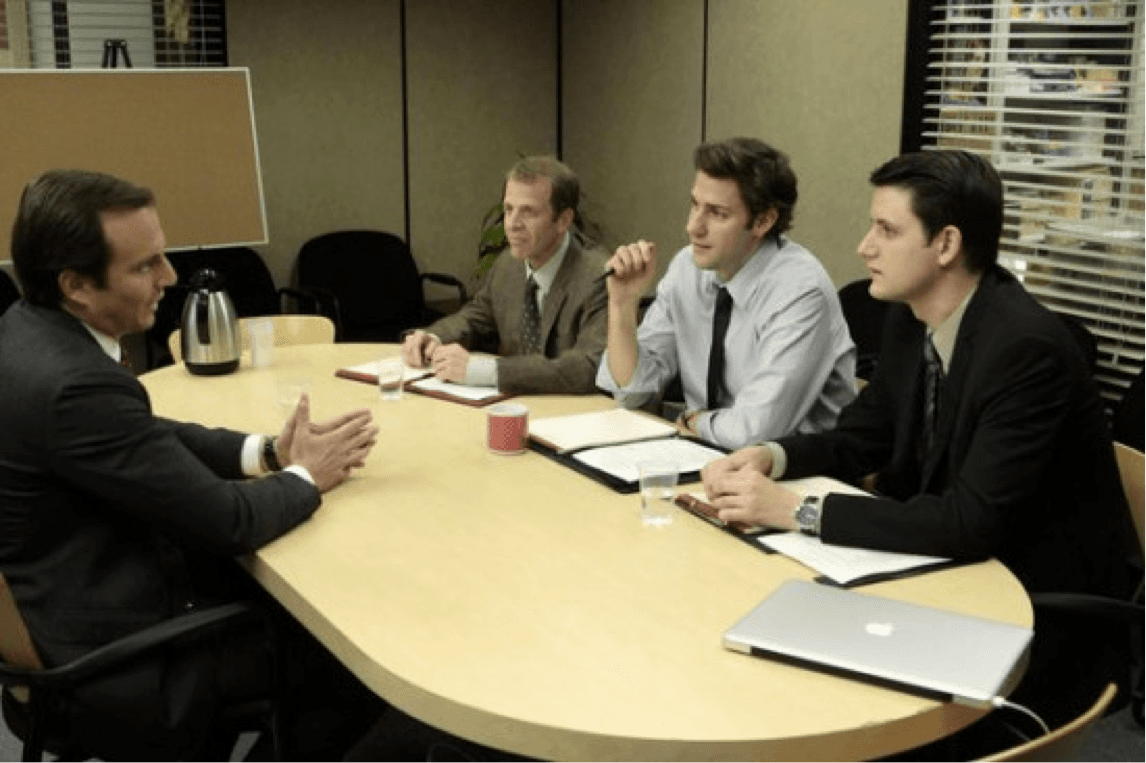Let’s say you as a recruiter just heard that Michael Scott’s position is now available. How would you fill this position? Who would you call to make first contact? What are the job requirements? How would you prep your candidates to interview?
The Season Finale of “The Office,” titled “The Search Committee,” features recruiting efforts to replace the vacant Scranton Branch Manager position held by Michael Scott.
This episode struck a chord with me as a recruiter since it provides the opportunity to view the drama of an interview process from the inside. On display is a comedic look at internal candidates jockeying for a higher position, interviewing faux pas, and the corporate bureaucracy we only hear about from phone calls with candidates and clients.
The final episode opens with the establishment of a 3-person Search Committee, hand-picked by the CEO, Jo Bennett. The committee members consist of Jim Halpert, an experienced salesman, Toby Flenderson, a soft spoken Human Resources Representative, and Gabe Lewis, the Coordinating Director of Emerging Regions for Sabre, Dunder Mufflin’s parent company. Gabe serves as a liaison between Corporate and the Scranton branch and is CEO Jo Bennett’s right-hand man.
The Candidates
On interview day we meet the internal candidates from within the Scranton Branch as well as external candidates invited in to interview. Riding up the elevator are internal candidates Stanley, Darryl, and Phylis dressed in their finest business attire, acting overly cordial with each other.
Darryl, a good-natured former warehouse foreman, looks like a strong internal candidate. He is well-liked, has leadership experience from within the company, ten years of service with Dunder Mifflin, and was recently promoted from the warehouse into the office. He takes a relaxed and informal approach in front of the interview committed and relies on his friendships with Jim, Toby, and Gabe to promote his candidacy. Darryl is overly confident and even makes note of his advantageous diversity status. At the end of his interview, we find out he’s lacking an important item at his interview when Jim asks for his resume. Darryl struggles to create a resume from scratch (may I suggest the ResuWe Resume Builder instead?) and calls Microsoft support to find Clippy, which is non-existent on his version on Windows. Give Darryl credit for being clever once his resume is finished; he lists he was responsible for coordinating 2.5 billion units of inventory, though it’s 2.5 million pieces of paper.
Kelly Kapoor becomes enraged with Gabe after he accuses her of not being a serious candidate when she describes managing her own department of one. Is an “individual contributor” with a manager title not a serious candidate?
The external candidate interviews are equally amusing. One of the candidates, an older gentleman, asks about the salary, if miles are covered, and if the company monitors his calls. (After a quick second I realized this character was played by the great Warren Buffett…don’t think Dunder Mifflin will be matching his salary!)
Thoughts on the candidates:
- Too casual?
- Overly confident in existing relationships?
- Need to rely more on actual work experience than other factors?
- Stretching the truth a bit?
- Appropriate timing for discussing salary?
- Thinking too far outside the box?
Sounds like they all needed a little pre-interview guidance…
The Hiring Manager
Jo Bennett, CEO of Sabre, is clearly the decision-maker even though she is removed from the first round of the interviewing process. She is based out Sabre’s corporate office in Florida. Jo makes sporadic visits to the Dunder Mifflin Scranton Branch but is not involved in the day-to-day operations. She empowers the Search Committee to screen the candidates, conduct interviews, and evaluate the candidates. Would Jo being more directly involved in the selection help speed along the decision-making process, or is her delegation of the recruiting process to the Search Committee a means for the Branch to come to their own consensus?
Thoughts on the hiring manager:
If you were on a call with Jo, how would you break down the Branch Manager job description? Here are a few questions to ask:
- How many people will this person be leading and managing? How many are in sales?
- Does this person need to have experience from within the paper industry?
- What percent of the time will the Branch Manager be hands-on in a sales role?
- Is this a structured or non-structured environment?
- What is the salary target and bonus/commission structure?
How could an external recruiter bring value?
Let’s say you are now the recruiter with an exclusive agreement to provide Jo and Dunder Mifflin external candidates. Given this is a management level position within an established organization, it can be extremely frustrating for an external recruiter to work hard recruiting for a position only to find out later that an internal candidate was promoted from within. A great way to dig into this is ask, “What skills or experiences from external candidates will beat out internal candidates?”
What additional questions could/should you ask at this point to ensure that you’ll make a good placement?
The season finale leaves us without a conclusive decision (Spoiler Alert…too late) so we don’t know who ends up replacing Michael Scott. In the meantime, there are some excellent lessons — mostly on what not to do during a search process – that can be learned from these final two episodes. Check them out, if for nothing more than a good chuckle, and see for yourself.
How would you approach filling this position if Dunder Mifflin was your client? Share your thoughts in the comments below!
